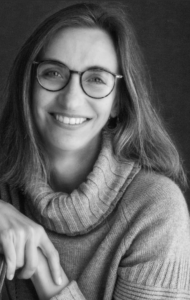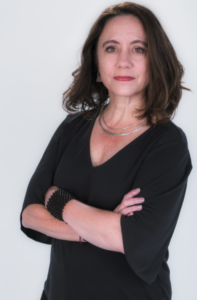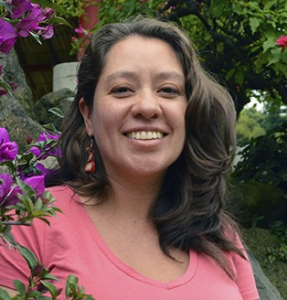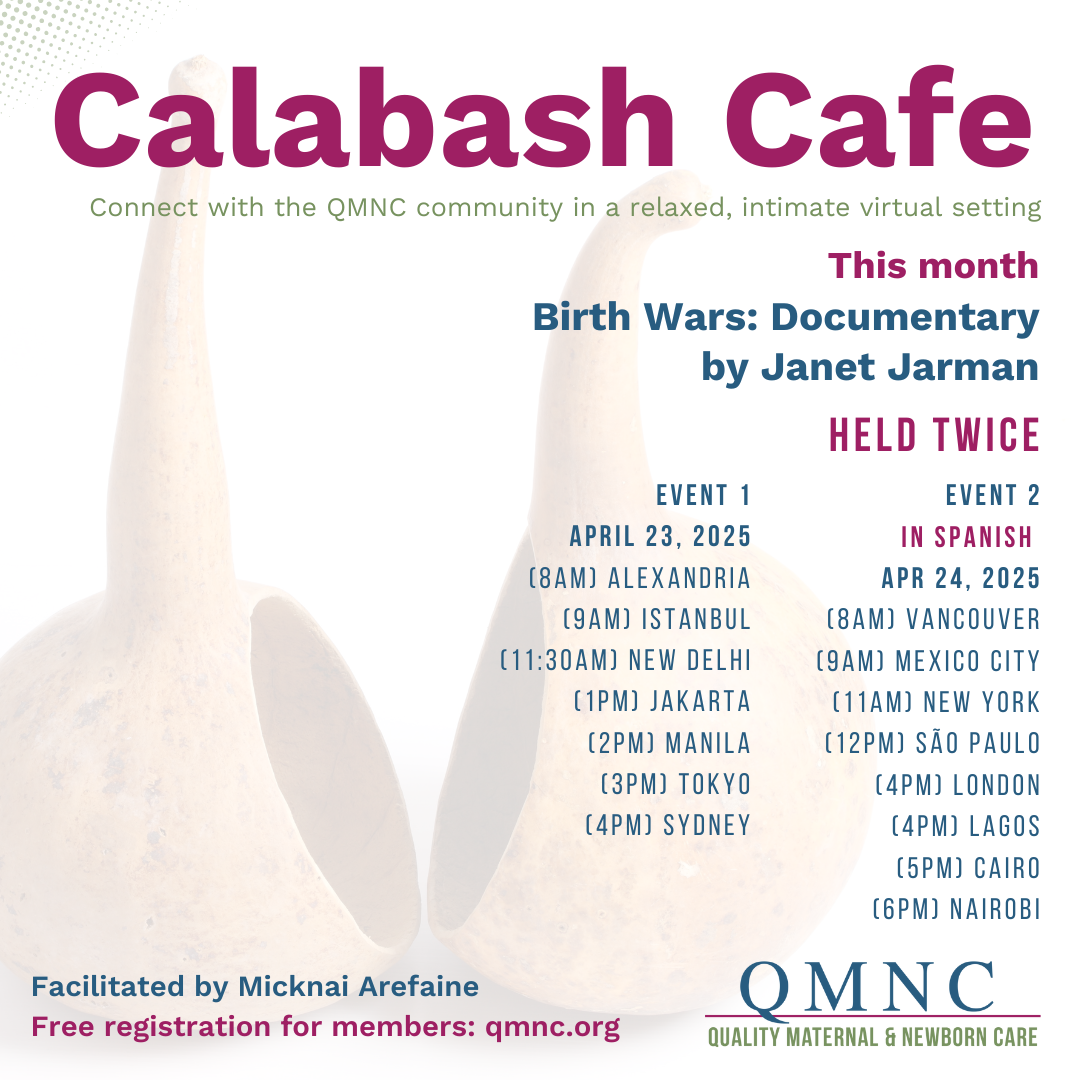QMNC Calabash Cafe
Join our monthly, virtual, global gathering and share stories, resources, and learnings related to reproductive justice.
Connect with the QMNC community in a relaxed, intimate virtual setting
At each Calabash Cafe, we will connect with and learn from our global community of researchers. Get comfortable, grab a cup of tea, and join us for a relaxed, facilitated experience.
Join us live and on the QMNC platform
Our live gatherings will include facilitated dialogue and networking sessions. Presentations will be recorded and posted on the QMNC platform, where we will continue the conversation and build community. We are rotating timezones to ensure these sessions are available to QMNC members regardless of where in the world you live.
Meet our facilitator, Micknai Arefaine
Micknai Arefaine (she/they) is a birthworker, cultural organizer, and reproductive anthropologist. She serves as QMNC Equity Project Manager and works with QMNC leadership and fellows on a scoping review of Epistemic Justice research. For her Master’s research in Applied Anthropology, Micknai led a study with her community of women in the Tigray region of Northern Ethiopia where she investigated how they model, express, and reflect the values of community, trust, care, stability, and futurity through their perceptions and sentiments regarding social and political change.
Meet the Guest Host Lorena Ibargüen

I am a Mexican researcher and educator, my academic work spans international cooperation and social policy research in both health and environmental fields. I have a PhD in International Development from the University of East Anglia (UK) and a postdoctoral fellowship from the Instituto José María Luis Mora (Mexico), where I explored the challenges of the prevailing birth model in Mexico and the potential of a midwifery-based approach. I have collaborated with grassroots organizations, the Mexican Association of Midwives, and the United Nations Population Fund on maternal health and midwifery-related research projects. Currently I’m a fellow with the Quality Maternal and Neonatal Care (QMNC), where I have worked to identify researchers' needs across countries and regions and also currently collaborating on a scoping review on home birth.
Meet the Birth Wars Director, Janet Jarman

Throughout her career, Janet Jarman has focused her photography and film work on exposing systems of power by telling deeply personal stories of committed people fighting for their rights against entrenched interests. Through establishing empathetic, trusting relationships with the people in her stories she has been able to produce in-depth projects focused on immigration, environmental issues, public health disparities, and violence against women.
Jarman’s photographs on these topics have been published in The New York Times, National Geographic, GEO, and Smithsonian, amongst others. Her stories have received numerous international awards, and she has served on the jury for prestigious industry contests.
During the last decade, she has worked primarily at the intersection of ancestral and biomedical birth cultures by documenting the lives of midwives and doctors in the trenches of the health systems of Mexico and Guatemala. This long-term project has resulted in a number of impactful photographic stories and in the award-winning film Birth Wars. She has also worked in Pakistan and Indonesia, showcasing the critical role of midwives during climate crises.
Jarman has been based in Mexico since 2005. She began her career in South Florida after graduating from The University of North Carolina at Chapel Hill. She worked as a staff photographer at The Miami Herald and later obtained a master’s degree in environmental issues at the University of London.
Meet the Birth Wars Producer, Sharon Bissell

Sharon Bissell is a senior philanthropic expert with experience designing high impact giving strategies for large and small donor agencies in a range of issues from reproductive rights and health, migration, transparency and accountability, and human rights.
Building from twenty years of experience at MacArthur Foundation’s Mexico Office, including eleven years as its Director, she is currently the Senior Philanthropic Advisor for Ariadne Charitable Trust, where she is spearheading a new field of work in children’s sexual rights and health in the digital age.
In solidarity with families searching for their loved ones to the wave of violence in Mexico since 2006, she was invited to serve as a founding member of the Mecanismo Extraordinario de Identificación Forense in 2022, as Technical Expert in International Cooperation.
At the John D and Catherine T MacArthur Foundation’s Mexico Office, Bissell led the design and implementation of philanthropic strategies for systemic change in the Mexican criminal justice system, and in the provision of public reproductive and maternal health services. Her team designed a regional migration strategy that engaged groups from Central America, Mexico and the United States. She led a four-year $17M USD initiative on birth justice, engaging grassroots groups, national advocacy and legal organizations, and multilateral and UN agencies. In coordination with the Ministry of Health the initiative led to new policies around birth justice and growing recognition of midwives. Under her leadership, the foundation enabled broad ranging support for state-level and national work to address grave human rights violations within the context of Mexico’s current human rights crisis. In 2018 the Foundation’s Mexico office had nearly $20 million USD in active grants to some 70 organizations.
Her conviction and support for trust-based, inclusive philanthropic strategies led her to be nominated Co-Chair of the Board of Directors of Fondo Semillas, Mexico’s feminist fund, and in 2019 to co-found Mexico’s newest national fund, Acento, Acción Local, which supports formal and informal movement building and activities for social justice and human rights at the local level.
In the 1990s, Sharon worked at the Information Group on Reproductive Choice, a leading Mexican reproductive justice organization, as a consultant for numerous Mexican feminist organizations and networks, and as a professor at the University of Puerto Rico. In 2013, she was a visiting scholar at the Woodrow Wilson Center’s Mexico Institute.
She holds a master’s degree from Tulane University, a bachelor’s degree from Whitman College, and diploma courses in gender, reproductive health and human rights from El Colegio de México and the Universidad Tecnológica de Monterrey in Mexico. She is a dual citizen of Mexico and the United States, and has lived in Mexico since 1995, and lived, studied and worked in the United States (mainland and Puerto Rico), France, and Japan, and speaks English, Spanish and French.
Meet Researcher Jimena Fritz, MD, MSc, ScD

Dr. Jimena Fritz is a researcher at National Institute of Public Health (INSP) in Mexico, where she has been coordinating several projects focused in maternal and neonatal health since 2010. In 2009, she served as the president of the Association of Students of the School of Public Health of Mexico. She has also participated in academic exchanges at Emory University in Atlanta, the University of California, San Francisco (UCSF), and the University of North Carolina at Chapel Hill, USA the latter as part of her thesis project on impact evaluation. Dr. Fritz has presented the findings of her research at both national and international conferences and has published in various academic journals. Her primary areas of interest include maternal and
perinatal health.

Our next Calabash Cafe
Facilitator:Micknai Arefaine
Guest Host: Lorena Ibarguen, QMNC Fellow
Guest Speakers: Birth Wars filmmaking team Janet Jarman, Director, Cinematographer, and Sharon Bissell, Executive Producer
Topic: A screening and discussion of the film Birth Wars
Event 1: Wednesday, April 23, 2025 at 2:00 AM EDT.
Event 2: Thursday, April 24, 2025 at 11:00 AM EDT. Held in Spanish.
Told through deeply personal stories in the trenches of the healthcare sector, Birth Wars chronicles a power struggle between doctors and midwives in Mexico about whose vision of childbirth should prevail. The film takes viewers on a journey into two worlds driven by prejudices and antagonism and explores how building bridges between these worlds could help save lives.
After the film, our conversation will explore:
- How might the promotion, conduct, and translation of QMNC-aligned research build critical bridges between birth care providers in Mexico, and other regions with similar tensions?
Don’t miss it! This Spanish-language film (with English Subtitles) explores concepts central to QMNC’s priorities, particularly Priority 1, the Midwifery Model of Care.
Registration is free for QMNC members.
(Find the time in your time zone here)
Spanish film (English subtitles)
Discusion in English
(Find the time in your time zone here)
Spanish film (English subtitles)
Discusion in Spanish
Not a Member?
Why the name “Calabash Cafe”?
The calabash has many names in many languages and has a long history of use by humans. It is a symbol of home, the womb, community, water, and wisdom.
We chose this name because both the Calabash and the Cafe are part of human existence around the world. They symbolize gathering together to drink from the universal and timeless well of knowledge and understanding. We look forward to learning from one another what these symbolize in our respective cultures and traditions while co-creating our own community as we gather around the Calabash.
“Indeed, throughout the African diaspora, among different religious and spiritual groups, the calabash is a sacred object that often serves divine purposes.” - Gina Athena Ulysse
“Many plants have worked their way into our lives, but few have done so with as much flair as the calabash. For over ten thousand years, people have used the calabash (known also as the bottle gourd and formally as Lagenaria siceraria) in all sorts of ways. They’ve eaten it as food. They’ve used it as fishing floats, as pontoons for river rafts, as goblets, as pipe stems. And around the world, people make music with it.” – Carl Zimmer
